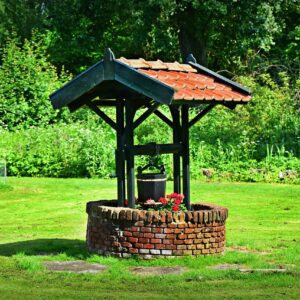George and I met in English lit. grad school over a half-century ago. Those were (literally) heady days: our laughing conversation was a back-and-forth ping pong with each other’s metaphors; our first argument was over symbolism in Moby Dick. So when we married about a year later, it truly was (to borrow Shakespeare’s phrase) a “marriage of true minds.”
Of bodies, too, of course. And though we continued playing our “mind games,” our relationship gradually (and fortunately) got more holistic. Raising a child, running a household…we were a partnership in love. I like how the Polish poet Wislawa Szymborska imagines this sort of togetherness in her poem “Golden Anniversary“:
Gender fades, mysteries molder, distinctions meet in all-resemblance just as all colors coincide in white. Which of them is doubled and which missing? Which one is smiling with two smiles? Whose voice forms a two-part canon? When both heads nod, which one agrees? Whose gesture lifts the teaspoon to their lips?
Or Jehanne Dubrow’s image in “Pledge“:
Now we are here at home, in the little nation of our marriage, swearing allegiance to the table we set for lunch or the windchime on the porch…
But of course, no little nation of marriage can remain consistently peaceful. So naturally George and I have had our skirmishes, as “Pledge” goes on to elaborate:
If I were a patriot, I would call the blanket we spread across our bed the only flag—some nights we’ve burned it with our anger at each other.
Somehow, though—and long ago—George and I moved past the warring phase. We live now in a longstanding, collaborative peace: he makes our bread and desserts, I make our dinners; he does the vacuuming, I do the dusting; he tends our garden, I do our laundry; together we listen to our favorite podcast while knitting (each with our preferred knitting technique: brioche for him, stranding colorwork for me); together we go to Mass, and say Morning and Evening Prayer from The Liturgy of the Hours; together we sit reading, each with our current book.
In other (poetic) words, we are blessed to share in the gifts of long married love that Richard Wilbur celebrates in a poem to his wife, “For C,” published in his collection Mayflies and written when he and Charlotte had been married (like George and me) about fifty years. After following, in deliberately hyperbolic images, some torrid dramas of tumultuous love, the poem continues:
We are denied, my love, their fine tristesse And bittersweet regrets, and cannot share The frequent vistas of their large despair, Where love and all are swept to nothingness; Still, there’s a certain scope in that long love Which constant spirits are the keepers of, And which, though taken to be tame and staid, Is a wild sostenuto of the heart, A passion joined to courtesy and art Which has the quality of something made, Like a good fiddle, like the rose’s scent, Like a rose window or the firmament.
Above, I called long married love a “gift.” But for Wilbur, it’s something more: an “art,” “something made,” exemplified in the four images of the closing couplet’s crescendo. First is human craftsmanship (“a good fiddle”), then nature’s art in the rose’s scent. Then—quite a sweeping crescendo here—nature’s rose taken up as the work of human hands into the rose window characteristic of medieval cathedrals.
And then, as the poem’s climactic image, “the firmament”—which is made of course not by humans or nature but by God. Wilbur was a practicing Christian, so it makes sense to me that he’d end his poem on long married love by putting it ultimately in God’s hands.
I’m grateful that he does this, because George and I definitely know the need for God’s aid in this final phase of our life together. We both have chronic illnesses: his heart disease, my leukemia. And then there’s the simple fact of aging. Mortality is of course the human lot…but there’s something special about living with it looming so large. It helps us treasure each day together. Before going to sleep each night, we say to each other “thank you for everything”—because if one of us dies during the night, we want these to be the final words we’ve exchanged.
We are each like the woman at the end of Robert Frost’s poem “Not to Keep.” Her husband has been returned to her after recovering from wounds suffered in World War I. But she knows:
They had given him back to her, but not to keep.
Each day, George and I are given again to each other, “but not to keep.”
But I don’t want to end this post with the present moment. I’d rather end by gathering in my arms our whole half-century of life together. And who better to give words to this long love than Shakespeare (in Sonnet 116):
Let me not to the marriage of true minds Admit impediments. Love is not love Which alters when it alteration finds, Or bends with the remover to remove: O, no! it is an ever-fixed mark, That looks on tempests and is never shaken; It is the star to every wandering bark, Whose worth’s unknown, although his height be taken. Love’s not Time’s fool, though rosy lips and cheeks Within his bending sickle’s compass come; Love alters not with his brief hours and weeks, But bears it out even to the edge of doom. If this be error, and upon me prov’d, I never writ, nor no man ever lov’d.
Peggy Rosenthal has a PhD in English Literature. Her first published book was Words and Values, a close reading of popular language. Since then she has published widely on the spirituality of poetry, in periodicals such as America, The Christian Century, and Image, and in books that can be found here.





